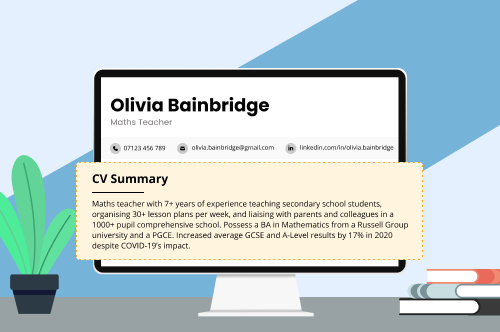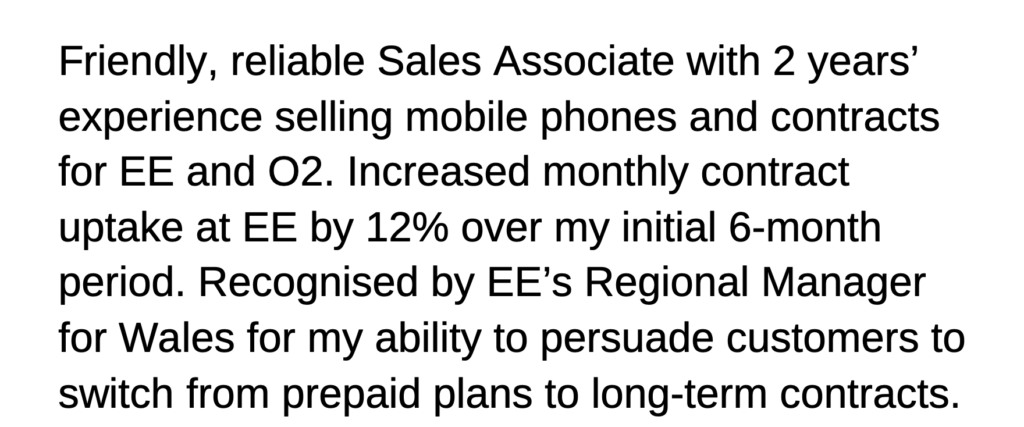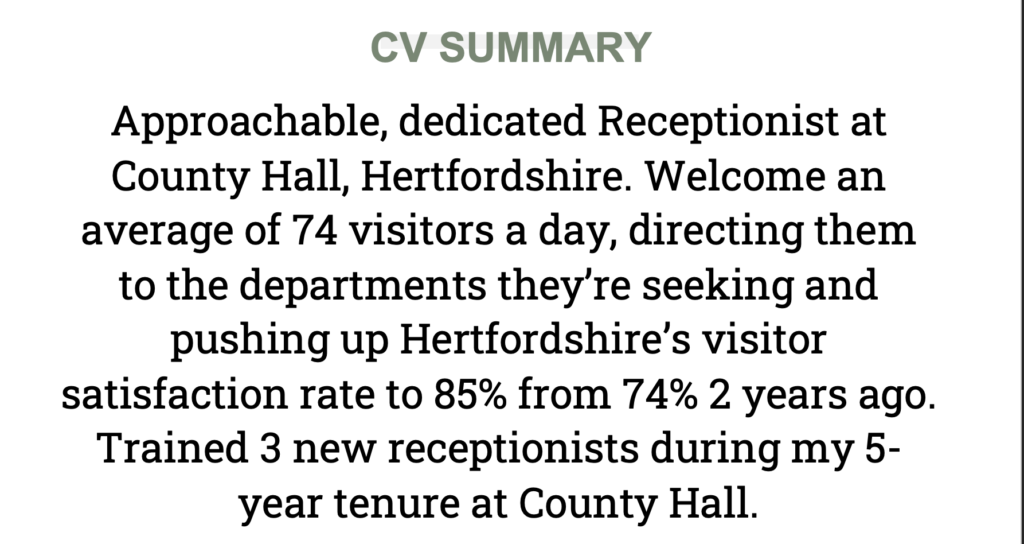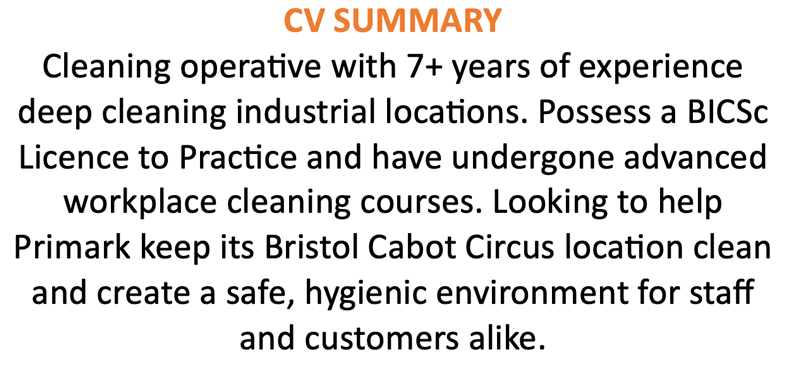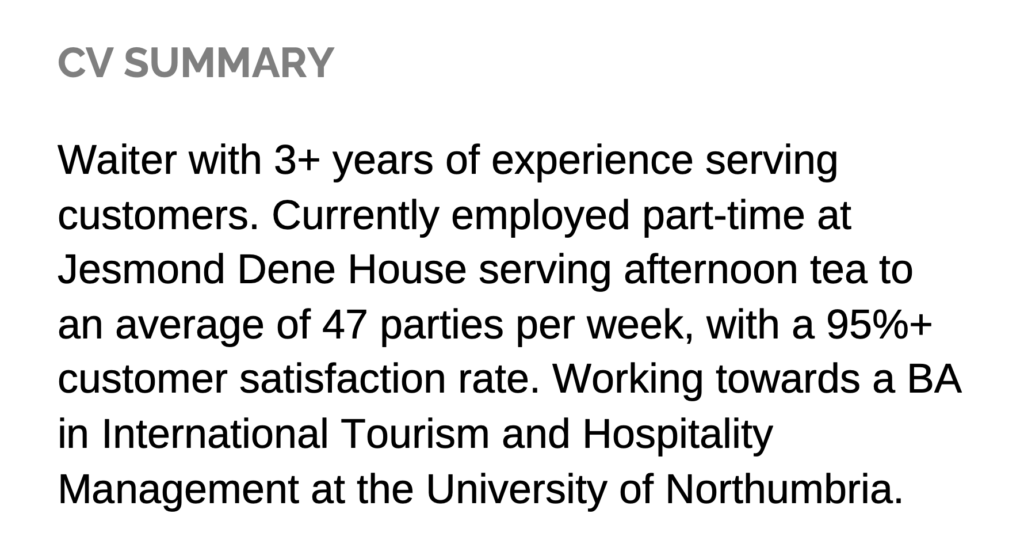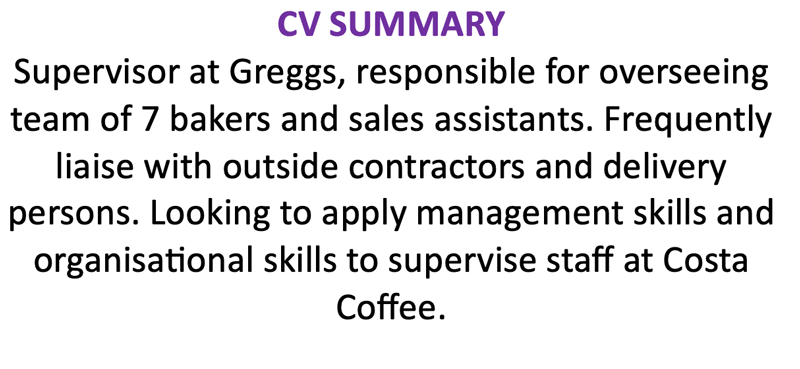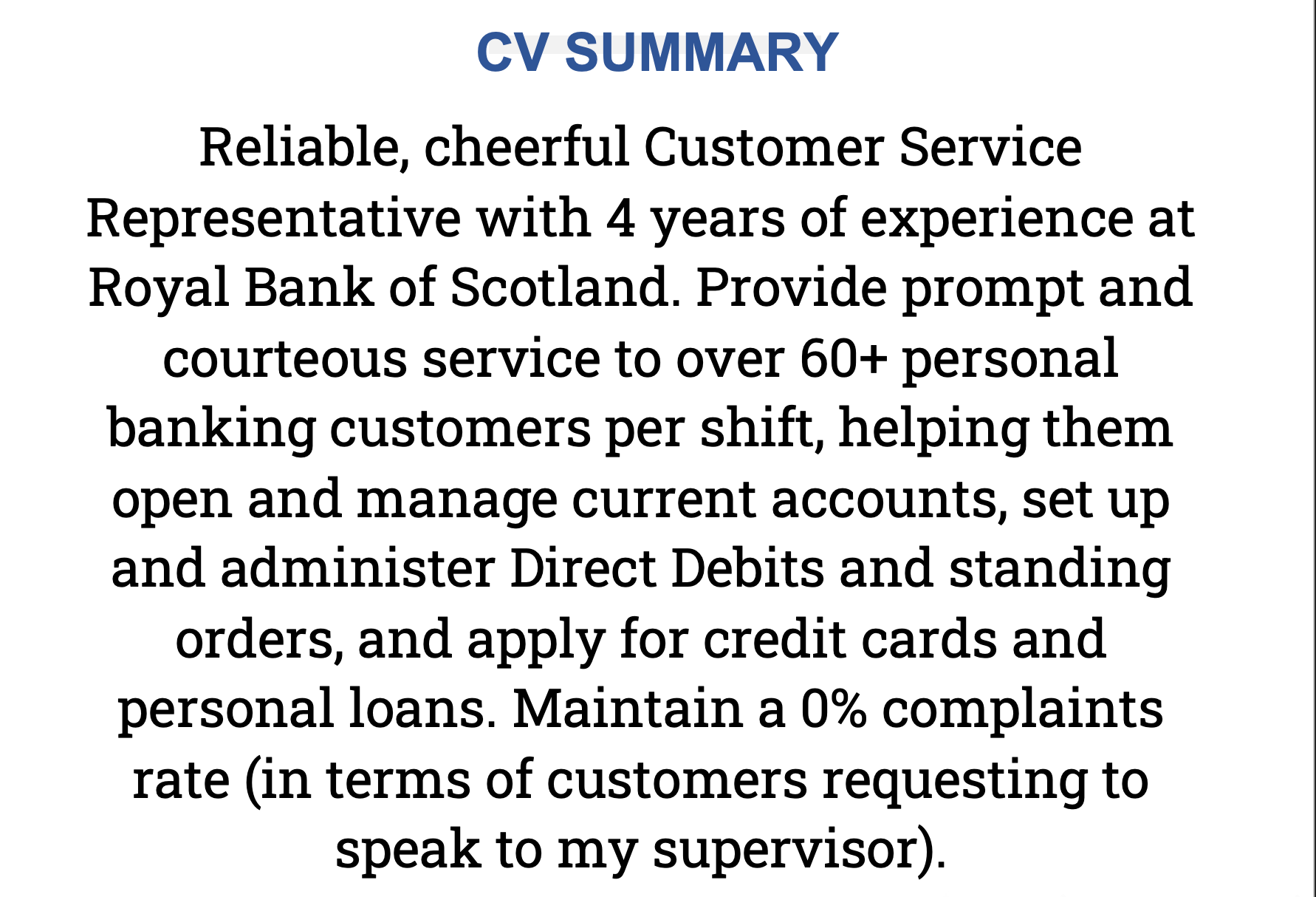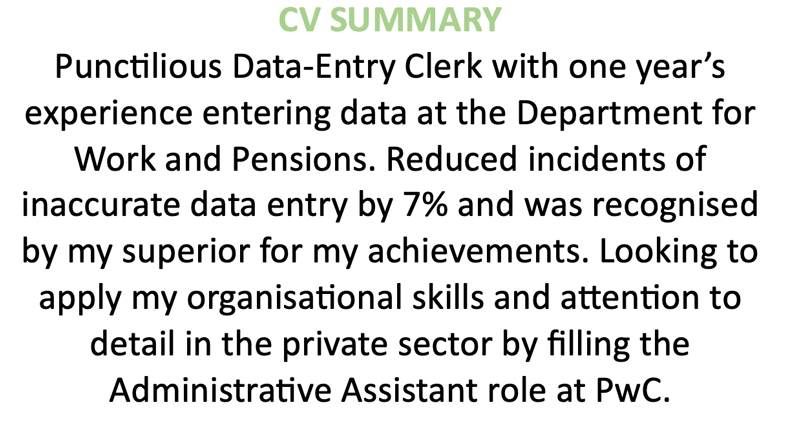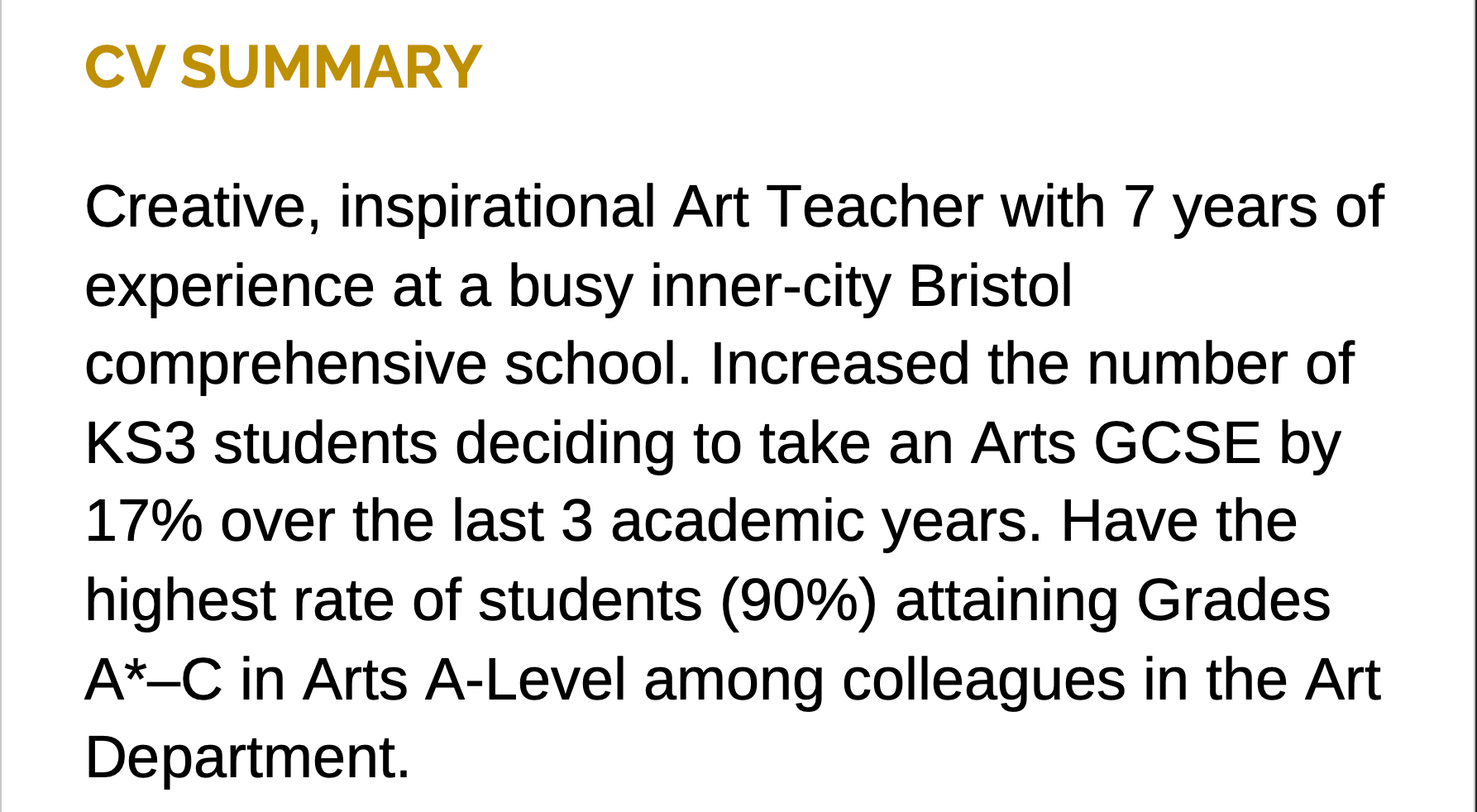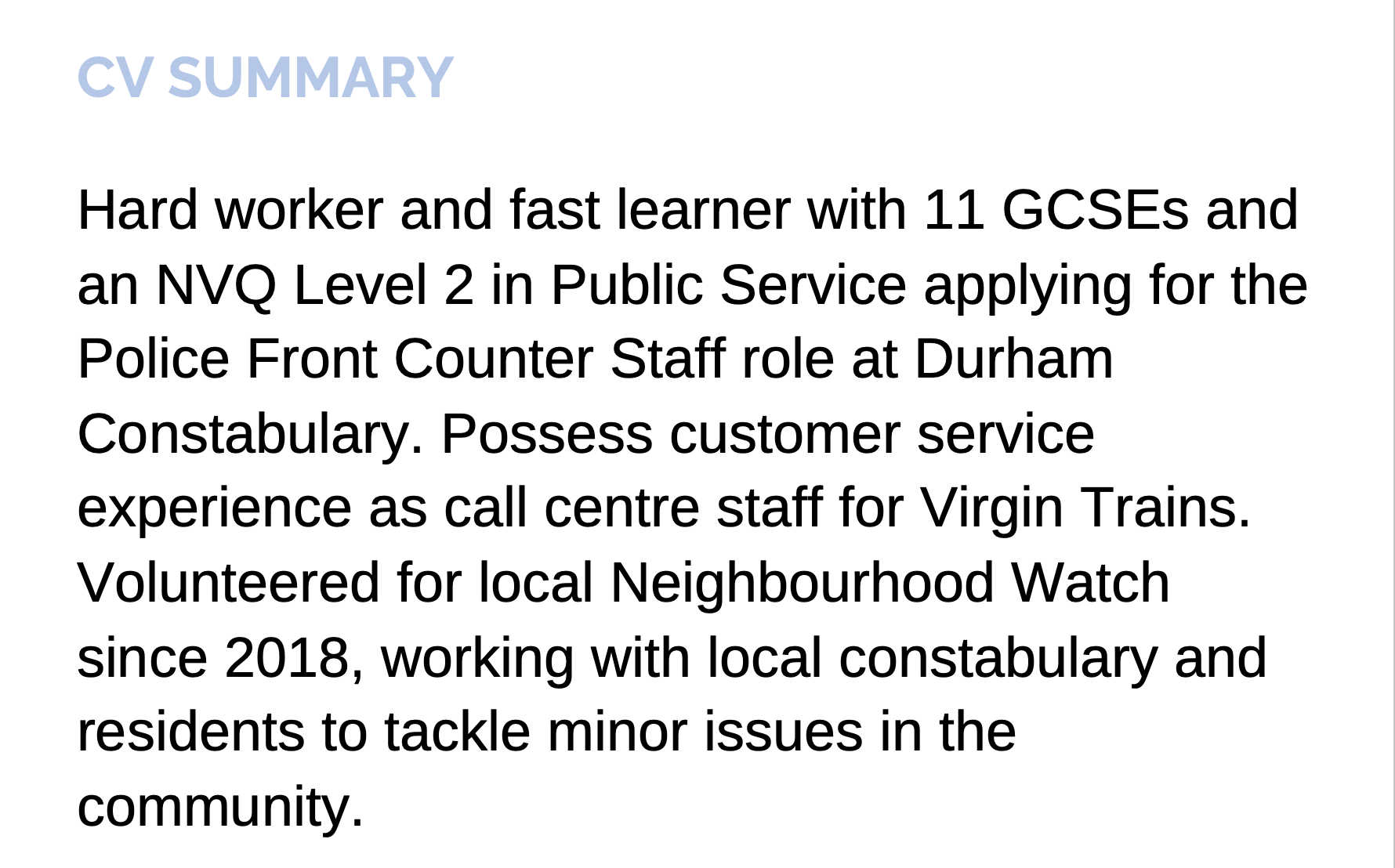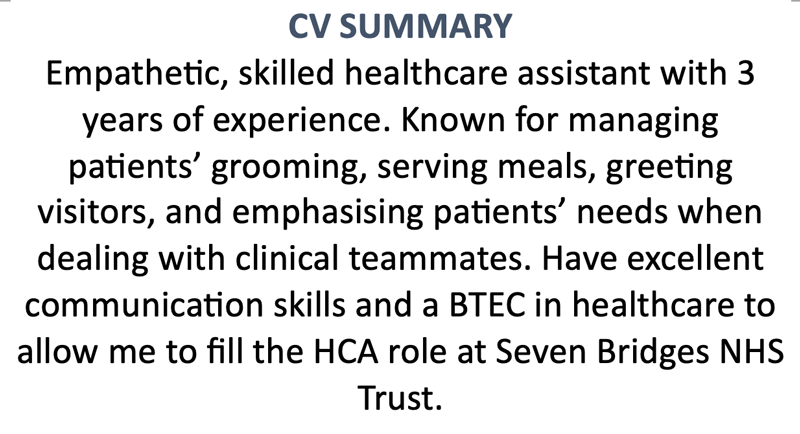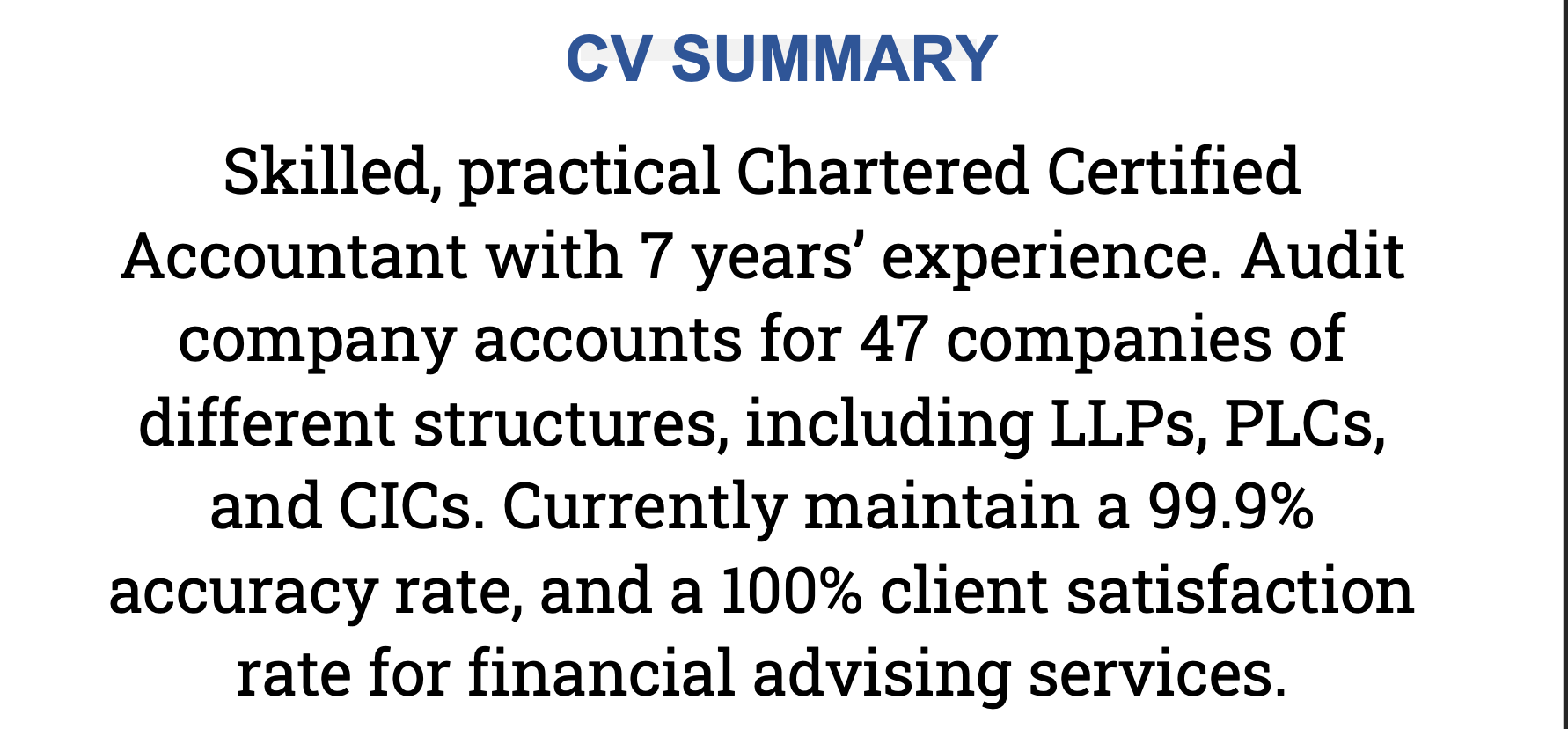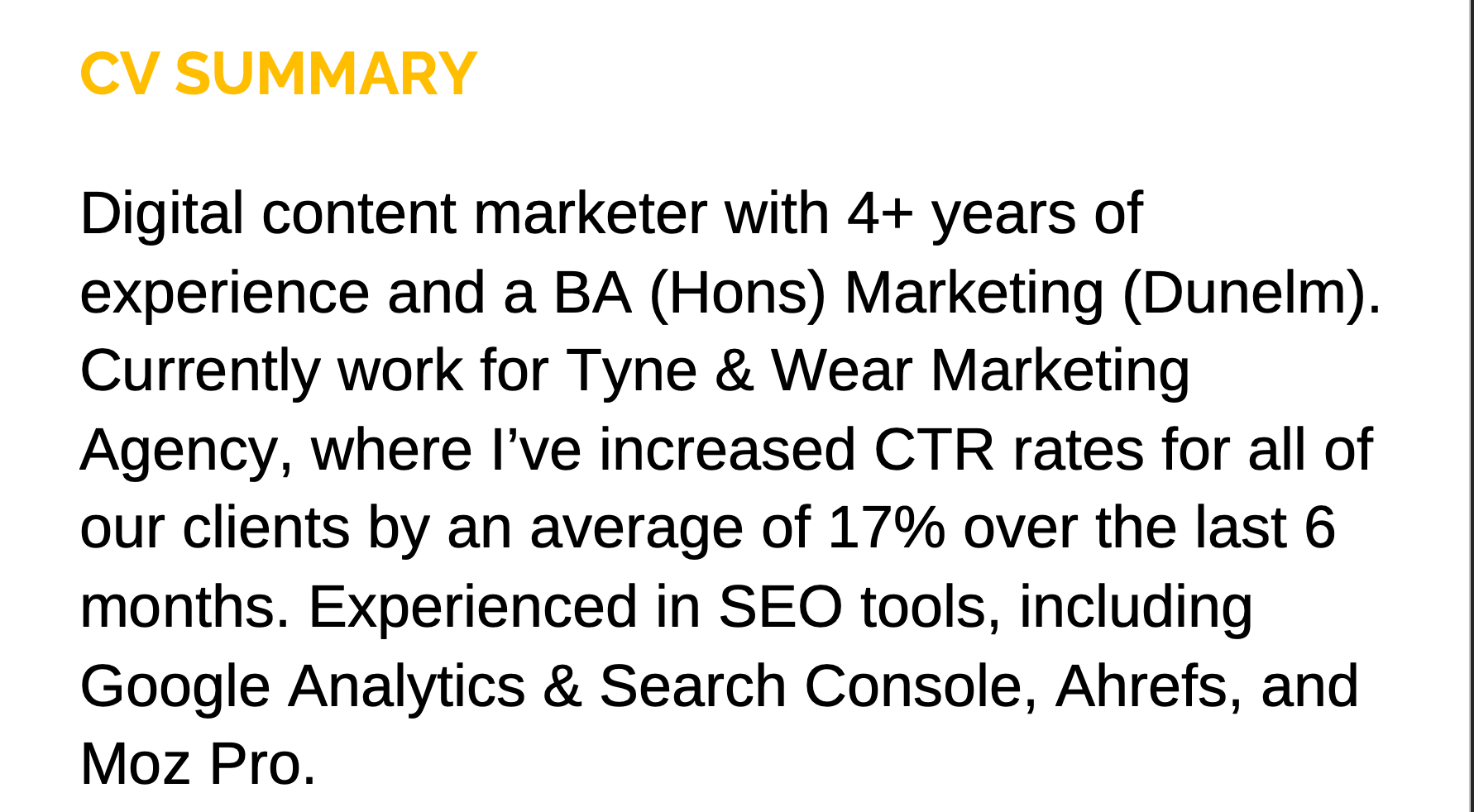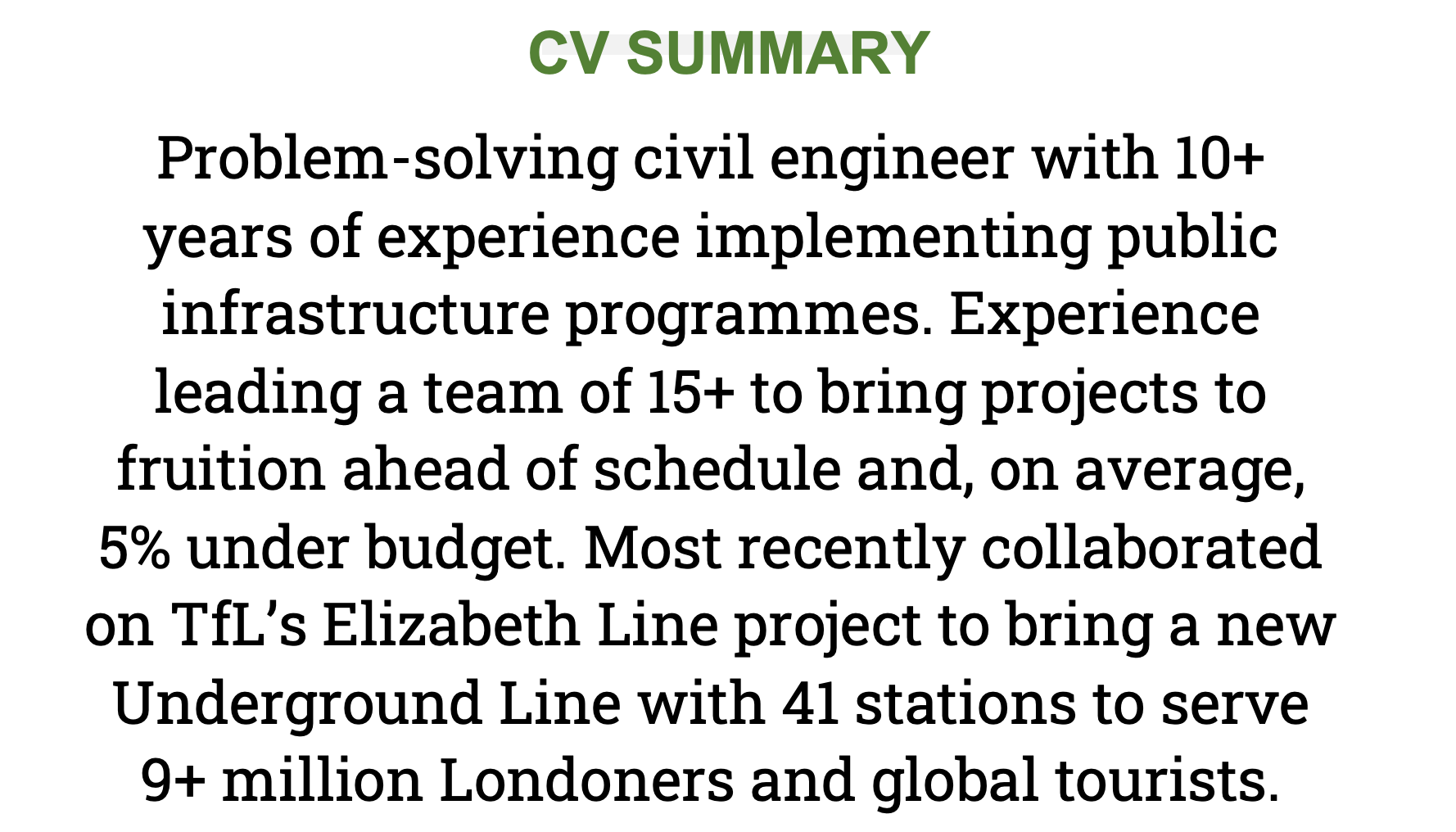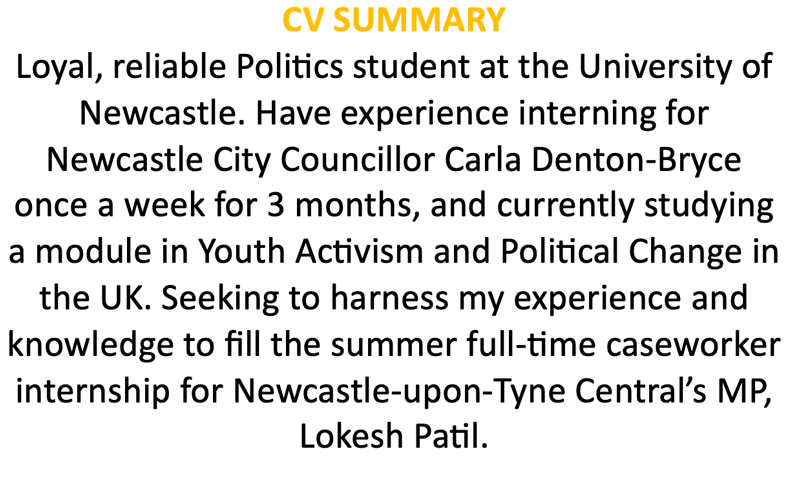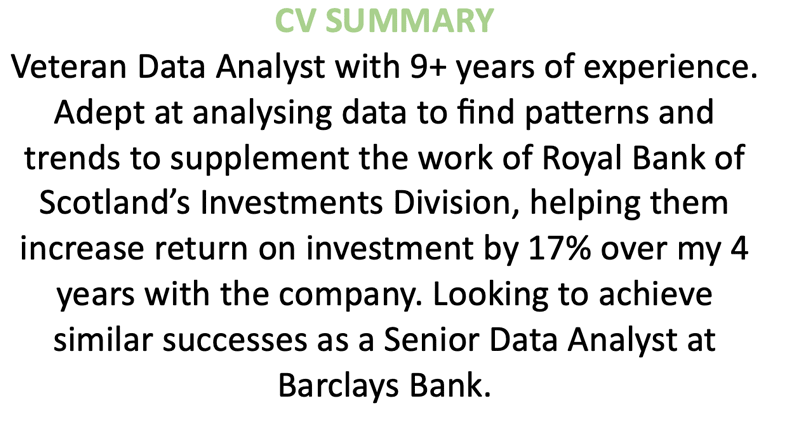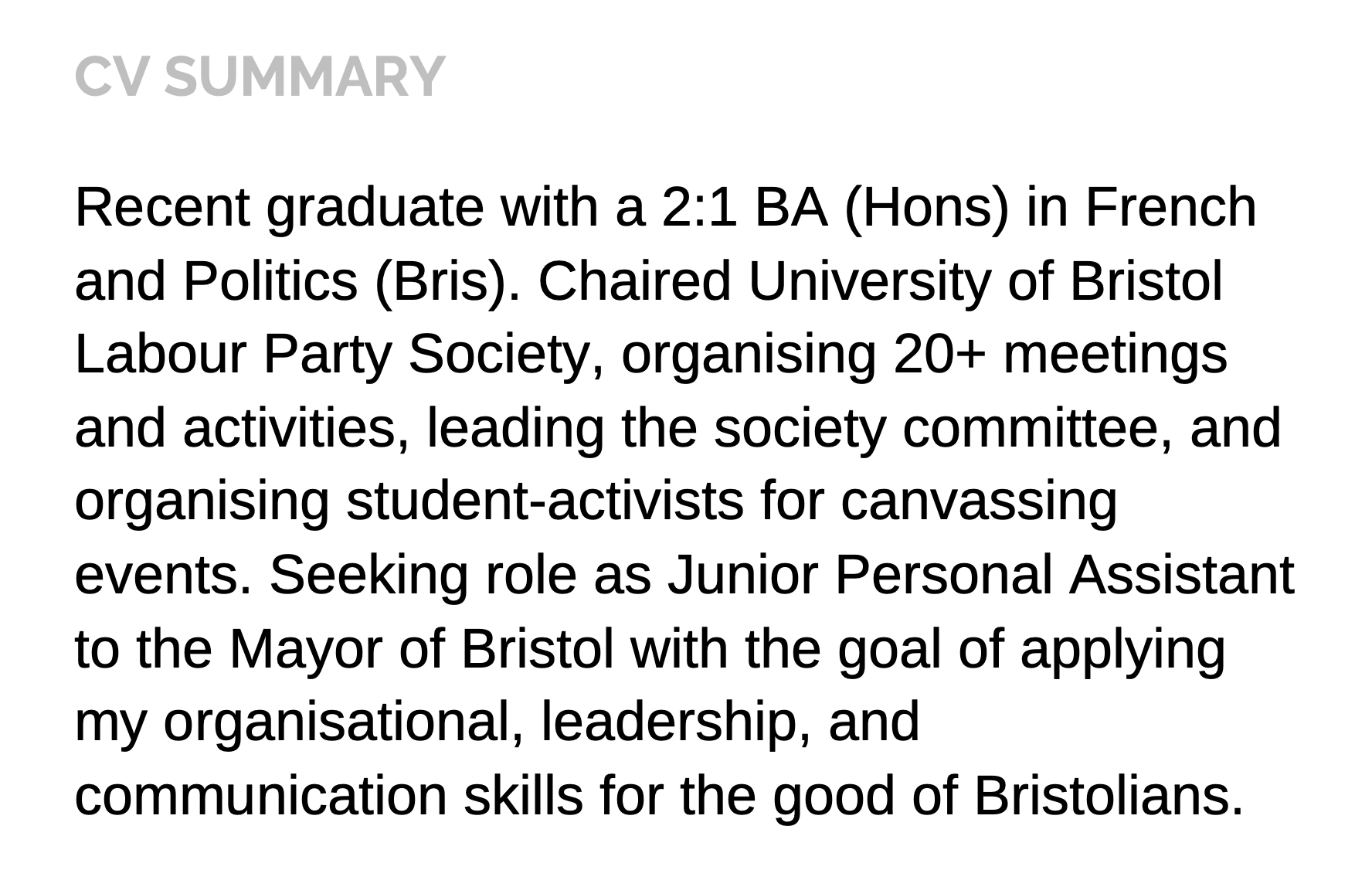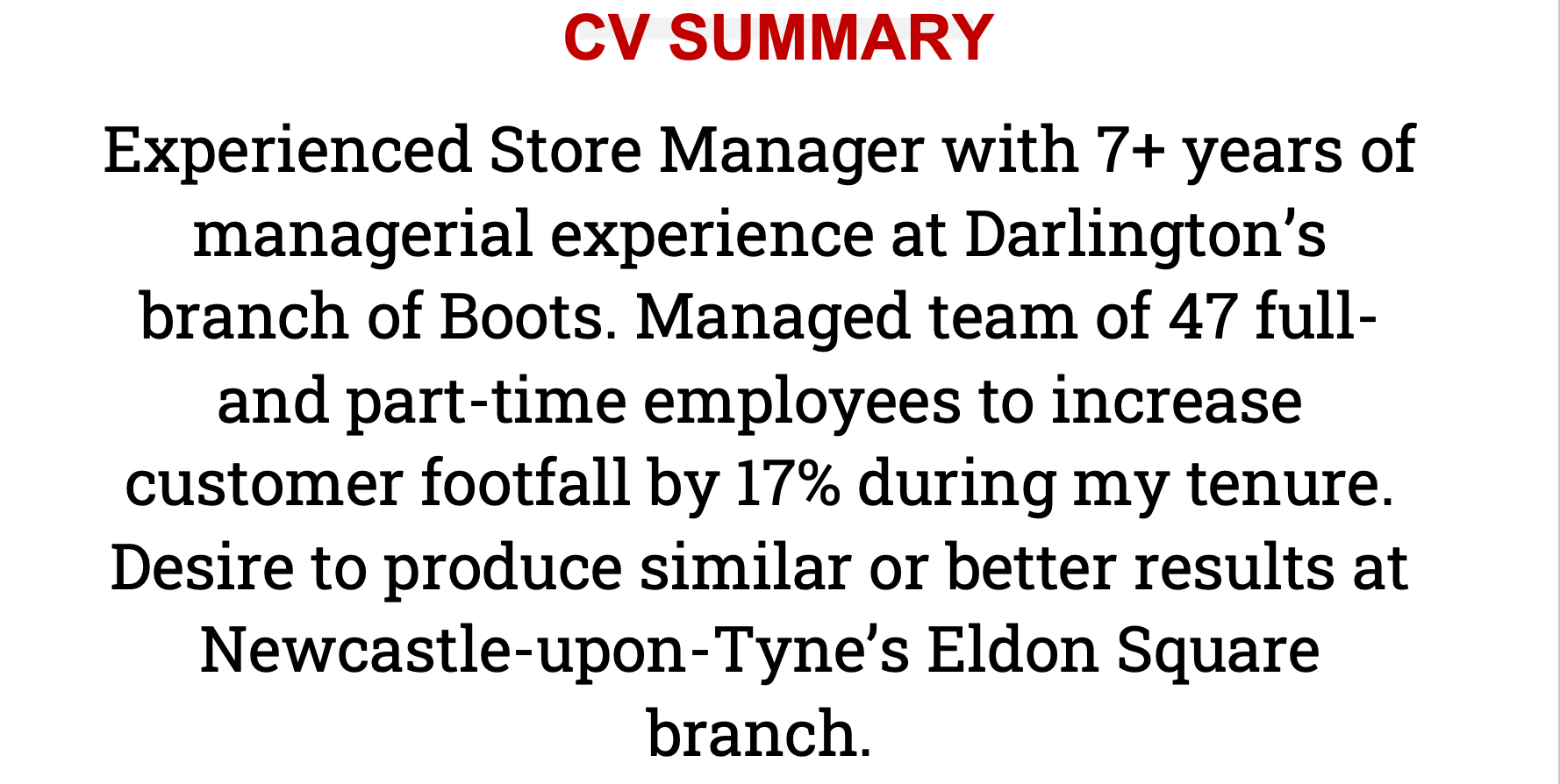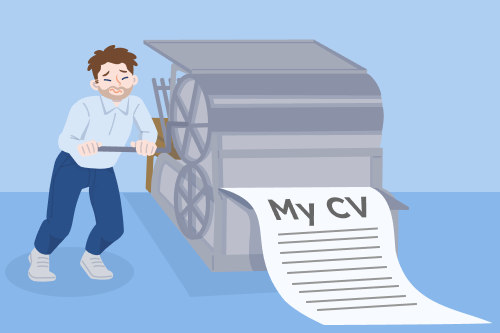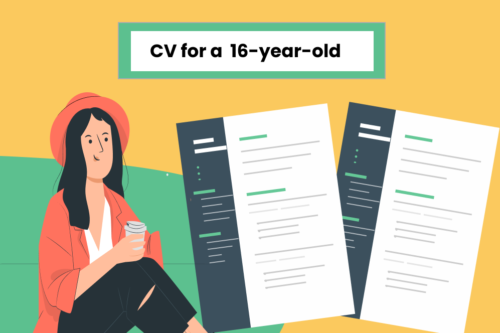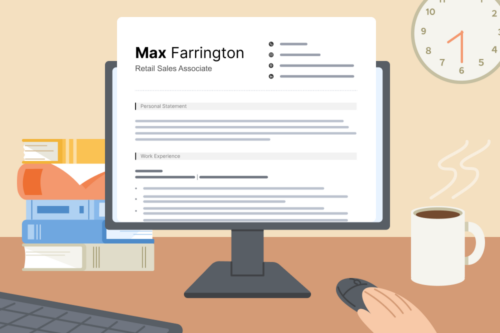What is a CV summary? (& example to copy and paste)
A CV summary is a short 3–5 sentence profile of your work history. It can also be a 3–5-bullet list. Your CV summary will detail your most impressive accomplishments, key skills, and relevant academic and vocational qualifications.
Your summary sits at the top of your CV’s structure, where employers will see it first. The opening sentence of your CV summary needs to grab the reader’s attention, so it should contain your most sellable qualities.
Other names for a CV summary
A CV summary is also known as a:
But don’t worry about the name you give this section — they’re the same thing.
Copy-and-paste example of a summary for a CV (UK job)
17+ CV summary examples
Here are 17 professional CV summary examples that you can use for inspiration as you write yours.
Sales associate CV summary
If you’re writing a sales associate CV, look at this CV personal summary example for ideas:
Related CV samples: Sales manager CV, sales CV, sales assistant CV, sales executive CV
Receptionist CV summary
Crafting a receptionist CV? Write something along these lines and your CV is sure to impress:
Cleaner CV summary
As a cleaner, you’ll be tidying up in the workplace. Here’s a neatly organised cleaner CV summary example:
Related CV template: Hospitality CV
Waiting staff CV summary
Looking for waiting staff work? Highlight your skills, qualifications, and work experience in a professional summary on your waiter CV.
Related CV samples: Waiting staff CV, McDonalds CV, restaurant manager CV, barista CV
Supervisor CV summary
Check out this example supervisor CV summary to get some ideas for writing your own:
Related CV templates: Assistant manager CV, manager CV, team leader CV
Customer service representative CV summary
Here’s an effective customer service CV summary that uses hard numbers to showcase the candidate’s excellent customer service skills:
Related CV examples: Customer service advisor CV, customer success manager CV
Administrator CV summary
If you’re applying for administrative roles, you’ll need to highlight your time management and organisational skills on your CV:
Related CV templates: Administrative assistant CV, administrator CV, civil service CV, office manager CV
Teacher CV summary
Here’s an example personal summary for a CV written by a teacher for inspiration:
When writing a teacher CV, always clarify which key stage you’re trained for, what kind of teaching qualification you have (e.g., PGCE), which subject(s) you teach, and what kind of school you’ve taught at (e.g., primary or secondary, comprehensive or grammar, and state, public, or private).
Related CV samples: Teaching assistant CV, tutor CV, librarian CV
School leaver CV summary
If you’re leaving school after your A-Levels or GCSEs, mention your academic and vocational qualifications first, and any formal, volunteer, or internship work experience too.
Volunteer work always boosts a school leaver CV so consider looking for volunteer opportunities near you.
Related CV templates: Teenager CV, volunteer CV, internship CV, one-page CV
Healthcare assistant CV summary
If you’re working for the NHS, you’ll need lots of hard skills related to your medical abilities, so emphasise them in your healthcare assistant CV summary.
Related CV samples: Health care assistant CV, support worker CV, nursing CV, care worker CV
Accountant CV summary
Writing an accountant CV? As you’re used to dealing with data, stick some hard numbers into your CV summary to provide context for your achievements:
Related CV examples: Account executive CV, account manager CV, finance CV
Marketing CV summary
Underline your experience as a marketer by showing how you improved the sales of products you worked on.
Related CV templates: Marketing CV, PR CV, social media CV
Engineering CV summary
Individual and team successes should be highlighted in an engineering CV summary, as you can see in this CV summary template:
Related CV examples: Engineer CV, civil engineer CV, mechanic CV
Student CV summary
Writing your student CV? If you don’t have work experience yet, talk about union or society roles you’ve held, volunteering experience you’ve had, or the course or individual modules you’re studying.
Related CV templates: Law student CV, medical student CV, student ambassador CV, student nurse CV
Data analyst CV summary
Writing a data analyst CV? Add some data into your CV summary to show recruiting managers what you’re capable of achieving for them.
Related CV templates: Data scientist CV, ecommerce CV, business analyst CV
Graduate
This professional summary from a graduate CV specifies how the applicant can use their skills to perform the role outlined in the job description.
If you have little to no experience, you may not have accomplishments, so it’s fine to connect the skills you do have with the job you’re seeking — and you can always look at other graduate CV examples to get even more ideas for how to link your abilities to your target position.
Related CV examples: Academic CV
Retail
Interested in a career in retail? Put your best foot forward by writing a good retail CV summary.
Including hard numbers in your summary is a great tactic if you’re writing a retail CV. Here are some ideas for numbers:
- How much you increased sales
- How many customers you served daily/weekly
- How many colleagues you worked with
Related CV templates: Retail assistant CV, shop assistant CV, Tesco CV
Need more ideas of how to write an effective job summary for your job application? Have a look at industry-relevant CV examples to see how another applicant in your field has done so.
How to write a summary for a CV
Still unsure how to put together an effective CV summary? Follow these three steps to put together a professional summary for your CV that perfectly profiles your career.
One key CV writing tip is to leave making your summary until last. First, learn how to write a good CV, write it (including sections like work history, education, skills, etc.), and then pick out the best achievements on your CV for your summary.
1. Start with your years of experience and main responsibilities
In the first sentence of your CV summary, provide your position or industry, years of experience, and key job responsibilities.
For example, if you’re writing a nursing CV, mention your speciality (e.g., paediatrics, gynaecology, mental health, orthopaedics, etc.), level (e.g., RN, matron, nurse practitioner, ward sister, etc.) and years of experience.
Also worth mentioning is what you do every day at work. For example:
Ward Sister on the Paediatrics Ward at the King George Hospital, Kingston-upon-Thames with 7+ years of experience providing care to children.
This sample briefly sums up the job applicant’s current job title, years of experience, key responsibilities, and their daily duties.
2. Name your biggest achievement
Employers don’t just want to know what you do on the daily. Use your second sentence to describe a big achievement — one that’s relevant to the job you’re applying for.
‘Relevant to the job’ means that the accomplishment is something potential employers would like you to repeat for them. For example, if you increased iPhone sales at Vodafone, O2 would be interested in hearing about it.
Here’s a sample noteworthy accomplishment in a CV summary:
Spearheaded a new marketing strategy for the London Overground that led to an 11% increase in ticket sales during Q1 2023 despite many people still working from home.
See how this job hunter uses hard numbers to give employers some context about their accomplishments To include hard numbers in your CV, you could also use amounts in pounds (e.g., ‘Increased profits by £47,000).
Try to fit numbers into your CV summary no matter what job you’re applying for.
Here are some more examples of hard numbers highlighting achievements in CV summaries:
Served as Front Desk Agent at Newcastle’s New Croft House Clinic, processing an average of 147 patients per day.
Averaged £147 in commission per week from CeX for being No. 1 salesperson in its busy Marylebone branch.
Manned the front desk at a busy grammar school with 2,470+ pupils.
3. Mention other skills and achievements that make you the perfect fit
In the last sentence of your summary, mention any other skills, qualifications, or licences that make you the perfect fit for the job you’re going for.
For example, if you’re applying for a position that requires technical abilities, name-check some of the tools you know how to use. Take this plumber CV summary:
You can also add extra details about any work-related accomplishments, as in these chemist and lorry driver CV summaries:
Achieved a 100% error-free rate in dispensing prescriptions.
Clocked up 470,000+ miles while maintaining a <4.7% lateness rate.
If you’re a school leaver, graduate, or entry-level applicant and don’t have many achievements, abilities, or qualifications to add to your summary, use this last sentence to talk about your career goals:
Excited to use my interpersonal skills to provide visitors to St Ives with an informative and entertaining experience as Tour Guide.
If you’re struggling to finish your summary, try adding hobbies and interests to your CV summary if they’re relevant to the role:
Frequently asked questions about CV summaries
Here are the answers to several frequently asked questions about CV summaries:
Should you put a summary on a CV?
Yes, you should put a summary on a CV. While technically you could write a CV without a summary, we recommend adding one so the recruiting manager can quickly see whether they should continue reading your CV.
So make things easier for the recruiting manager by adding a CV summary.
Not sure how to add a CV summary without minimising some other vital CV section? Good CV makers can add a CV summary in a way that keeps your CV sections well balanced.
What are 4 things to avoid in a CV summary?
Here are 4 things to avoid in a CV summary:
- negative comments about your current and previous jobs or colleagues
- talking about what you want from the job without considering what kind of person the company needs
- adding qualifications you don’t have
- making it obvious you don’t know anything about the company or the position
How can I make my CV summary attractive?
You can make your CV summary attractive by using a splash of colour, as we’ve done in the examples on this page. However, keep the rest of your font colours black.
Good CV makers use colour appropriately to make your best selling points stand out while avoiding unprofessional CV designs. What’s more, your CV will be ready in just a few minutes — saving you time to apply for even more jobs.
Build My CV Now
